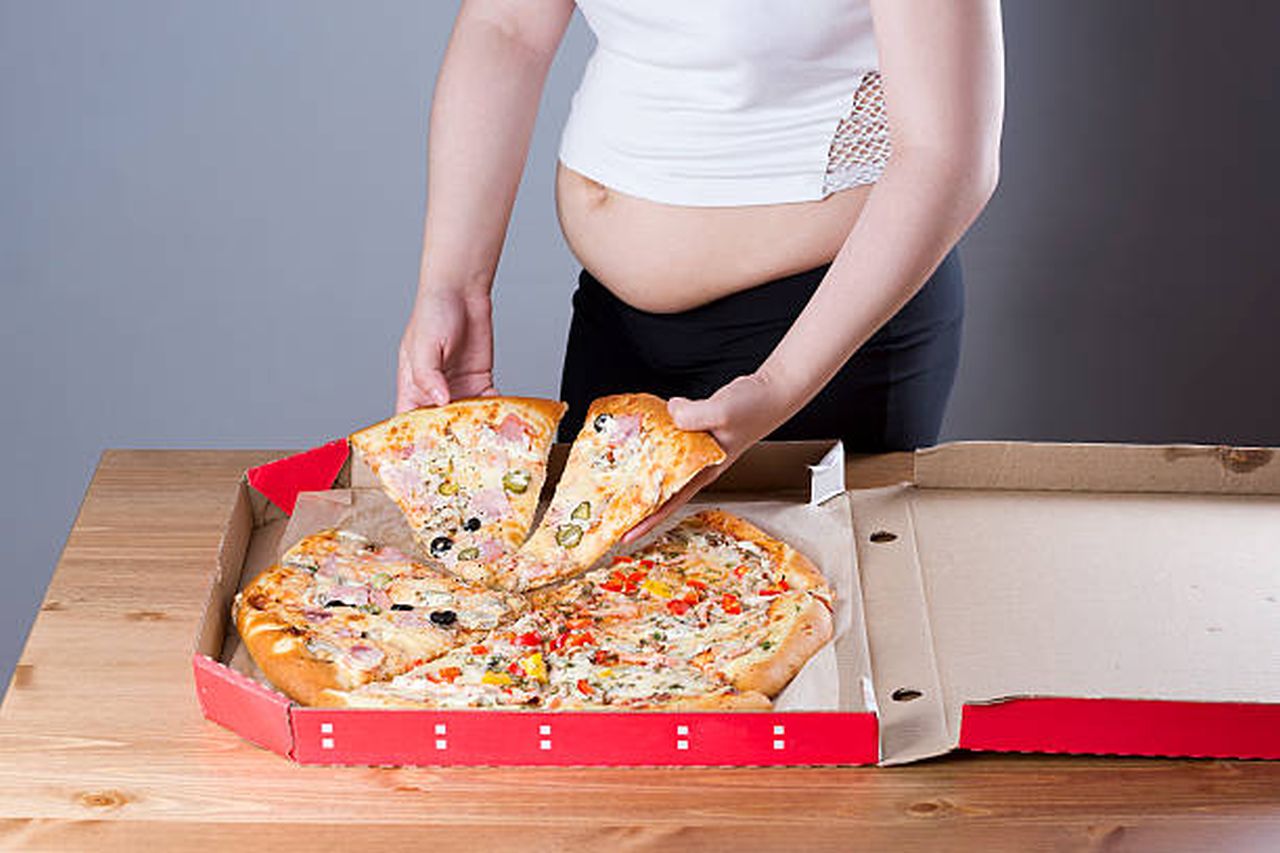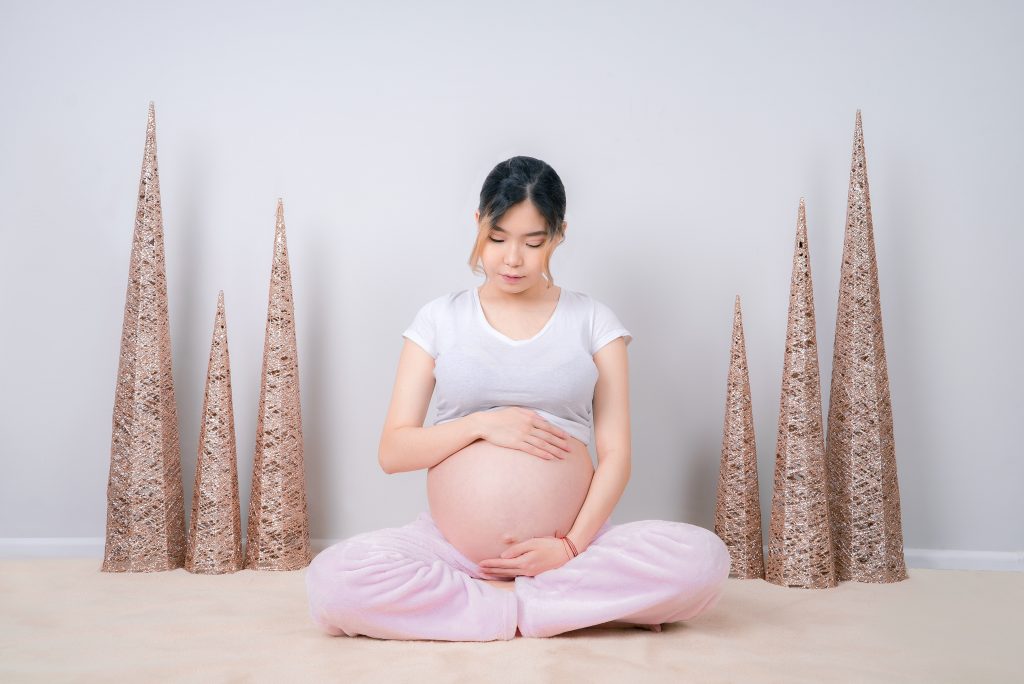As the pregnancy progresses, it's not uncommon for women to experience a loss of appetite. It is crucial to understand the potential reasons in order to take the necessary actions.
Loss of appetite can be caused by a number of different things, including sickness, heightened sensitivity to scents and tastes, hormonal changes that impact taste, changes in body weight, and inadequate or excessive sleep.
If you've lost your appetite, this article will discuss possible causes and how to fix them.
Variations in Food Cravings and Dislikes During Pregnancy
Pregnancy is characterised by changes in appetite and by sensations of nausea or morning sickness.
Some women suffer from dietary aversions, while others develop intense desires for specific meals. Although these shifts in hunger are common throughout pregnancy, they can make it difficult to eat healthily.
Reduced Appetite in the First Trimester of Pregnancy
What Causes Loss Of Appetite In The First Trimester?
It's estimated that up to 75% of pregnant women experience nausea and vomiting, which can lead to a significant decrease in appetite. It's understandable that someone who spends a lot of time squatting can't quite get up an appetite.
Some women's aversions to certain foods during pregnancy can be explained by the fact that their bodies, experiencing morning sickness, may be trying to shield the developing baby from anything that could harm it.
Rising levels of oestrogen and hCG (the hormone responsible for making you cry during the car commercial) contribute to the pregnancy-related triad of nausea, heightened olfactory sensitivity, and decreased appetite. A metallic aftertaste could also develop.
If I Lose My Appetite During the First Trimester, What Should I Do to Ensure That My Nutritional Needs Are Met?
If you're not feeling particularly hungry at the beginning of your pregnancy, here are some suggestions to ensure that you and your unborn child get the nutrition you both need.
Get yourself a drink. More important than counting calories is making sure you're getting enough fluids.
Eight to ten 8-ounce glasses of vegetable and fruit juice, water, and other plant-based beverages per day is generally recommended, while this number might vary widely depending on individual preferences and dietary habits (just be mindful of your sugar intake on the latter).
If you feel queasy when drinking water, try switching to a ginger-flavored beverage like ginger ale or ginger tea, or flavouring your warm water with ginger or lemon.
However, it is important to consult with your doctor before consuming any herbal tea or other beverage, as some of these are not safe to consume while pregnant.
To avoid going too far, please. Instead of forcing yourself to eat larger portions, try eating six little meals a day (your body will usually let off hunger signals every two hours).
Consume a light meal. When hunger strikes during the day, it's best to load up on protein and complex carbs to maintain steady blood sugar and sate your appetite for longer.
Bananas and a dollop of yoghurt, both high in calcium and protein, may also help ease digestion. Crackers made from whole grains or that are otherwise plain are usually safe bets.
To avoid a strong odour, stay away from strong-smelling foods. This means you may have to forego some of your favourite fast food dishes, such as burgers, fries, and chicken nuggets, because they are either too spicy or too greasy for you. Consider a salad with grilled chicken or salmon instead.
Make aesthetic decisions. Certainly, as the saying goes, variety is the spice of a healthy diet. If spinach makes you sick but kale doesn't bother your stomach, consume the kale. I assure you, you will return to the spinach.
Modify the thermostat settings. During pregnancy, some women like warm beverages and snacks, while others prefer ice cold. Modify your diet as necessary if you find yourself in one of the above categories.
Ensure that you supplement your diet with vitamins. Brush your teeth and take your prenatal vitamins twice a day.
Start taking it at least a month before trying to conceive so that you don't have to worry about temporary nutritional gaps around delivery time.
Seek out more support. Nausea can be alleviated by taking a prenatal vitamin that contains more B6, so discuss this option with your doctor.
Or, you might try taking a prescription drug that contains a vitamin B and antihistamine combination to alleviate your nausea and restore your appetite.
Do you need some accessories to complete your baby's room? Browse a wide selection of baby nursery accessories online.
Reduced Appetite in the Second Trimester of Pregnancy
What Causes Loss Of Appetite In The Second Trimester?
Many pregnant women consider this time to be the best of their pregnancies, when they are visibly pregnant and beautiful but their bellies haven't ballooned to the size of a watermelon.
The good news continues: many pregnant women report an increase in their appetite and a decrease in the number of times each day they need to spend hunched over in the restroom.
Now that you know what it's like to "eat for two," you could be hungrier than ever.
It's important to remember that not everyone experiences the seemingly inexhaustible hunger that often characterises the second trimester. Keep doing what you were doing in the first trimester if you're still feeling sick and not very hungry.
Also, beginning late in the second trimester, you may notice that your appetite is changing as your developing baby and uterus force you to feel full sooner after eating.

If I Lose My Appetite During the Second Trimester, What Should I Do to Ensure That My Nutritional Needs Are Met?
Maintain the routines you established in the first trimester if you are still experiencing appetite loss.
- It's important to hydrate well.
- Modify your eating habits to include more frequent, smaller meals.
- Increase your digestion by standing up as you eat.
- Avoid foods that are very pungent, greasy, or spicy.
- Attempt to make healthy nutritional changes.
- Be sure you and your unborn child are getting the nutrients you both need by taking your prenatal vitamin every day.
- When your stomach has calmed down and your appetite has returned to normal, it is crucial to make sure you are obtaining enough of the most important nutrients, such as:
- Calcium intake should average 1,200 milligrammes each day (including the benefits of prenatal vitamins)
- Everyday protein intake should be 75 grams.
- Folate 400–600 mcg daily, combined (You may find relief from constipation during pregnancy by eating more high-fiber foods, such as beans and greens.)
- To improve a child's cognitive development, doctors recommend giving them 200–300 milligrammes of omega-3 fatty acids every day (As soon as you're able to tolerate it, attempt to eat two portions of pregnancy-safe fish per week.)
Reduced Appetite in the Third Trimester of Pregnancy
What Causes Loss Of Appetite In The Third Trimester?
During the last few months of pregnancy, you may have noticed that your sickness has subsided and your belly has taken centre stage.
It's possible that your appetite has returned in full force, but even if it has, you may find that after eating a relatively little meal you're already struggling to catch your breath (which may have begun towards the end of the second trimester).
Because your uterus is expanding, it leaves very little room for your other organs, including your stomach.
Couple this with the hormonally-induced constipation (It can impede progress to the point where you lose interest in refuelling) and pregnancy-induced heartburn (This can make foods like hot sauces and citric fruits harmful).
Eating correctly is still important, but it may be more challenging in the third trimester since you may feel less hungry than you did in the first trimester and may suffer greater appetite aversion.
Browse our selection of top-notch infant car seas today!
If I Lose My Appetite During the Third Trimester, What Should I Do to Ensure That My Nutritional Needs Are Met?
Focus on the details. Eat several small meals throughout the day, as you did for the first 12 weeks, to avoid feeling hungry and to ensure that your body receives the nutrients it needs.
The compression of your stomach means that you can't eat much more, yet snacking frequently throughout the day increases the odds that you'll get enough food.
Even more so now that your nausea has subsided, you should be sure that your meals are providing you with the nutrients you need.
Eat plenty of fiber-rich foods. Eating lots of fiber-rich foods (including avocados, leafy greens, sunflower seeds, asparagus, and whole grain bread) will keep your digestive system running smoothly and relieve constipation.
You should try eating while standing up. Eating while standing instead of sitting can relieve some of the strain on your expanding belly.
Take it easy and drink lots of fluids (even if you're not thirsty) like you did in the first trimester.
Please continue taking your prenatal vitamins. Even though you aren't able to eat, this will still assist you and your baby get the nutrients you need.
It's easy to view meals as merely another chore to be completed. The status quo resembles that. But the reward for this minor chore is substantial: a happy, healthy newborn.
FAQS About Pregnancy
Dysgeusia, or a change in your sense of taste, during pregnancy likely is caused by pregnancy hormones. It may cause you to hate a food that you normally love, or enjoy foods you normally dislike. Sometimes it can cause a sour or metallic taste in your mouth, even if you're not eating anything.
If you're experiencing appetite loss due to nausea and vomiting, try to avoid fatty or spicy foods, drink fluids separately from your meals, and eat small, more frequent meals. You may more easily tolerate dry, salty snacks like pretzels and crackers, as well as bland foods like baked chicken breast.
Nuts are great to munch on during pregnancy, since they provide protein, fiber, healthy fat and minerals. Plus, they're a nutrient-dense food, so you don't have to eat a lot to satisfy your hunger, which is ideal for women who struggle with nausea or who tend to get full quickly toward the end of pregnancy.
Losing weight while pregnant, other than in the early weeks, is not healthy for you or your baby. Dieting, trying to stay the same weight or losing weight in the second or third trimester of your pregnancy can deprive your baby of nutrients needed to grow and develop.
Don't go to bed hungry.
Try adding some extra fiber to your dinner. Because your body digests fiber slowly, it will keep you full for longer. Fruits, vegetables, and whole grains like whole-wheat pasta are high in fiber – and have the added perk of helping prevent pregnancy constipation.
Do Most Pregnant Women Experience Loss of Appetite?
Pregnancy-related changes in appetite and dietary choices are common and may contribute to the amount of weight gain or reduction.
About six out of ten pregnant women report having an aversion to certain foods.
Some specialists have speculated that hormonal, psychological, or cultural factors are to blame for these shifts, but this is still up for debate.
How Does Aversion to Food Compare to a Lack of Appetite?
Low appetite can be caused by a general feeling of nausea, which is occasionally accompanied by vomiting, in contrast to food aversions, which involve a strong dislike of certain foods.
How Long Do Food Aversions Typically Last?
Loss of appetite is common during weeks 6–14 of pregnancy due to generalised nausea, which can strike at any time of day (it is not necessarily morning sickness').
During pregnancy, aversions to certain foods are common, but they typically subside as the pregnancy proceeds.
If you find that you have developed a dislike for a food that is vital to your diet, give it a couple of weeks and try it again; you might be surprised to find that your dislike has faded.
However, if you're not able to eat or drink enough because of your nausea, or if you're throwing up and can't seem to stop, or if you're losing weight, it's time to visit a doctor.
In Regards to What Type of Food Do Aversions Typically Occur?
Examples of common aversions to certain foods are:
- Spicy food
- Eggs
- Coffee/tea
- Alcohol
- Fatty food
- Meat
It has been found that pregnant women who experience nausea prefer sweet and bland dishes to those with strong flavours and spices.
Reasons for Food Aversions.
Food aversions during pregnancy have an unknown cause, but they may be related to hormonal changes in the first trimester.
Pregnancy, for instance, results in the production of the hormone gonadotropin, often known as hCG. Some of the symptoms it's known for are nausea, loss of appetite, and aversion to food.
Increased sensitivities to scent and taste are another way in which pregnancy can alter a woman's diet.
When It Comes to Food, Is There Any Way for Me to Get Over My Aversion?
In general, eating what you want and avoiding what you don't is a healthy and productive way to approach pregnancy.
If meat or a specific vegetable is among the items you're trying to avoid, think about what you could eat instead. Cover meat with nuts, as an illustration.
Smoothies made with fruit and green vegetables are another way to "conceal" the taste of healthy veggies. This manner, you may maintain a consistent intake of vitamins and minerals even when your dietary choices shift.
It's important to keep in mind that, in most cases, pregnancy-related changes in appetite won't pose any serious health risks to you or your kid.
Seek help if you have no idea which foods to prioritise in your diet or if you lack an appetite for foods that are good sources of key nutrients.
Tips for Women Suffering from Pregnancy-Related Appetite Loss
Loss of appetite can leave you wondering what to eat and how to get your diet back on track.
What You Should Prioritize For Meals
Even if you don't feel like you have the energy for full meals, there are a few items you should make a priority. You and your kid can rest assured that you will be getting enough nutrients with these.
These foods are both easy to prepare and gentle on the digestive system.
- Cold cuts, cheese and crackers, sliced deli meats, boiled eggs, Greek yoghurt, roasted chickpeas, and hard-boiled eggs are all good sources of protein.
- Vegetables that are low in flavour but high in fibre: raw spinach salad, steamed green beans, baby carrots, and sweet potatoes
- Light, sugary snacks, such a bowl of fresh berries, some oatmeal, some dried fruit, and some cold dairy items like basic cottage cheese.
- Cheese, quinoa, pasta, brown rice, and macaroni, and mashed or baked potatoes are all examples of boring grain/starch options.
- Chicken noodle and chicken rice soups.
- Smoothies and other nutritious liquids
In Addition, There Are
Those whose loss of appetite is brought on by nausea and vomiting may benefit from eating small, frequent meals, avoiding hot and greasy foods, and supplementing with ginger and thiamine. If you have access to it, acupuncture may also prove helpful.
High-dose supplements may be necessary to restore normal levels of nutrients if you have vitamin deficits related to lack of appetite. The use of any adjunct should be overseen and prescribed by a doctor.
Talking to a doctor can also help you get the treatment that's best for you.
How to Know When to Worry
As long as you are getting enough nutrients every day, sporadic or selective loss of appetite is usually not cause for alarm.
Loss of appetite now and then is nothing to worry about if you're otherwise healthy and gaining enough weight to support your growing baby.
Some pregnant women experience a loss of taste for some foods, particularly those with strong aromas or meat. Still, this is something that occurs quite frequently and is usually nothing to worry about.
Meal skipping is normal if it lasts less than a day, but if it continues for more than a day, you should talk to your doctor.
This is because you and your developing baby's health depend on adequate nutrient intake.

Complications Associated With Inadequate Prenatal Nutrition
Pregnancy-related issues due to undernutrition include poor foetal growth, low birth weight, and mother weight loss.
As a result, children may experience impaired cognitive development and behavioural issues.
Maintaining a healthy pregnancy requires a balance of macro and micronutrients.
Women who experience chronic nausea and vomiting during pregnancy have a higher risk of anaemia, foetal growth problems, and premature birth (32Trusted Source, 33Trusted Source).
Here's the Deal
A decrease of appetite or aversion to particular foods are both common when pregnant women's bodies adjust to their new normal. Even when you're starving, you might not feel like eating.
Keep in mind that a lack of appetite is a common symptom that frequently occurs in tandem with others, such as nausea and vomiting. It's common to experience fluctuations in your appetite.
Small amounts of bland, uncomplicated foods that are filling, nutrient-dense, and easy on the stomach may help if you've lost your appetite but are still hungry.
Always check in with your doctor if your loss of appetite persists or becomes persistent.
Conclusion
Pregnancy is characterised by changes in appetite and by sensations of nausea or morning sickness. Up to 75% of pregnant women experience nausea and vomiting, which can lead to a significant decrease in appetite. Some women suffer from dietary aversions, while others develop intense desires for specific meals. During pregnancy, some women like warm beverages and snacks, while others prefer ice cold. Nausea can be alleviated by taking a prenatal vitamin that contains more B6.
Or, you might try taking a prescription drug that contains a vitamin B and antihistamine combination to alleviate your nausea and restore your appetite. Many pregnant women report an increase in their appetite and a decrease in the number of times each day they need to spend hunched over in the restroom. If you're still feeling hungry in the second trimester, it's important to remember that not everyone experiences the inexhaustible hunger that characterises the first. Eating correctly is still important, but it may be more challenging in the third trimester. The compression of your stomach means that you can't eat much more, yet snacking frequently throughout the day increases the odds that you'll get enough food.
Eating lots of fiber-rich foods (including avocados, leafy greens, sunflower seeds, asparagus) will keep your digestive system running smoothly and relieve constipation. Loss of appetite is common during weeks 6–14 of pregnancy due to generalised nausea, which can strike at any time of day (it is not necessarily morning sickness'). Aversions to certain foods are common, but they typically subside as the pregnancy proceeds. Eating what you want and avoiding what you don't is a healthy way to approach pregnancy. Loss of appetite can leave you wondering what to eat and how to get your diet back on track.
There are foods that are easy to prepare and gentle on the digestive system that are good sources of protein and fibre. Nausea and vomiting may benefit from eating small, frequent meals, avoiding hot and greasy foods, and supplementing with ginger and thiamine. Acupuncture or high-dose supplements may help restore normal levels of nutrients if you have vitamin deficits related to a lack of appetite. Some pregnant women experience a loss of taste for some foods, particularly those with strong aromas or meat. This is normal if it lasts less than a day, but if it continues for more than that, you should talk to your doctor. A lack of appetite is a common symptom that frequently occurs in tandem with others, such as nausea and vomiting.
Content Summary
- As the pregnancy progresses, it's not uncommon for women to experience a loss of appetite.
- It is crucial to understand the potential reasons in order to take the necessary actions.
- Loss of appetite can be caused by a number of different things, including sickness, heightened sensitivity to scents and tastes, hormonal changes that impact taste, changes in body weight, and inadequate or excessive sleep.
- If you've lost your appetite, this article will discuss possible causes and how to fix them.
- Pregnancy is characterised by changes in appetite and by sensations of nausea or morning sickness.
- It's estimated that up to 75% of pregnant women experience nausea and vomiting, which can lead to a significant decrease in appetite.
- If you're not feeling particularly hungry at the beginning of your pregnancy, here are some suggestions to ensure that you and your unborn child get the nutrition you both need.
- More important than counting calories is making sure you're getting enough fluids.
- However, it is important to consult with your doctor before consuming any herbal tea or other beverage, as some of these are not safe to consume while pregnant.
- Instead of forcing yourself to eat larger portions, try eating six little meals a day (your body will usually let off hunger signals every two hours).
- When hunger strikes during the day, it's best to load up on protein and complex carbs to maintain steady blood sugar and sate your appetite for longer.
- To avoid a strong odour, stay away from strong-smelling foods.
- Certainly, as the saying goes, variety is the spice of a healthy diet.
- Modify your diet as necessary if you find yourself in one of the above categories.
- Ensure that you supplement your diet with vitamins.
- Brush your teeth and take your prenatal vitamins twice a day.
- Nausea can be alleviated by taking a prenatal vitamin that contains more B6, so discuss this option with your doctor.
- Or, you might try taking a prescription drug that contains a vitamin B and antihistamine combination to alleviate your nausea and restore your appetite.
- It's important to remember that not everyone experiences the seemingly inexhaustible hunger that often characterises the second trimester.
- Keep doing what you were doing in the first trimester if you're still feeling sick and not very hungry.
- Also, beginning late in the second trimester, you may notice that your appetite is changing as your developing baby and uterus force you to feel full sooner after eating.
- Maintain the routines you established in the first trimester if you are still experiencing appetite loss.
- It's important to hydrate well.
- Modify your eating habits to include more frequent, smaller meals.
- Increase your digestion by standing up as you eat.
- Attempt to make healthy nutritional changes.
- Be sure you and your unborn child are getting the nutrients you both need by taking your prenatal vitamin every day.
- During the last few months of pregnancy, you may have noticed that your sickness has subsided and your belly has taken centre stage.
- Because your uterus is expanding, it leaves very little room for your other organs, including your stomach.
- Eating correctly is still important, but it may be more challenging in the third trimester since you may feel less hungry than you did in the first trimester and may suffer greater appetite aversion.
- Eat several small meals throughout the day, as you did for the first 12 weeks, to avoid feeling hungry and to ensure that your body receives the nutrients it needs.
- The compression of your stomach means that you can't eat much more, yet snacking frequently throughout the day increases the odds that you'll get enough food.
- Eat plenty of fiber-rich foods.
- You should try eating while standing up.
- Eating while standing instead of sitting can relieve some of the strain on your expanding belly.
- Take it easy and drink lots of fluids (even if you're not thirsty) like you did in the first trimester.
- Even though you aren't able to eat, this will still assist you and your baby get the nutrients you need.
- It's easy to view meals as merely another chore to be completed.
- But the reward for this minor chore is substantial: a happy, healthy newborn.
- Low appetite can be caused by a general feeling of nausea, which is occasionally accompanied by vomiting, in contrast to food aversions, which involve a strong dislike of certain foods.
- During pregnancy, aversions to certain foods are common, but they typically subside as the pregnancy proceeds.
- However, if you're not able to eat or drink enough because of your nausea, or if you're throwing up and can't seem to stop, or if you're losing weight, it's time to visit a doctor.
- Food aversions during pregnancy have an unknown cause, but they may be related to hormonal changes in the first trimester.
- Some of the symptoms it's known for are nausea, loss of appetite, and aversion to food.
- In general, eating what you want and avoiding what you don't is a healthy and productive way to approach pregnancy.
- Seek help if you have no idea which foods to prioritise in your diet or if you lack an appetite for foods that are good sources of key nutrients.
- Loss of appetite can leave you wondering what to eat and how to get your diet back on track.
- Even if you don't feel like you have the energy for full meals, there are a few items you should make a priority.
- You and your kid can rest assured that you will be getting enough nutrients with these.
- These foods are both easy to prepare and gentle on the digestive system.
- High-dose supplements may be necessary to restore normal levels of nutrients if you have vitamin deficits related to lack of appetite.
- The use of any adjunct should be overseen and prescribed by a doctor.
- Talking to a doctor can also help you get the treatment that's best for you.
- As long as you are getting enough nutrients every day, sporadic or selective loss of appetite is usually not cause for alarm.
- Loss of appetite now and then is nothing to worry about if you're otherwise healthy and gaining enough weight to support your growing baby.
- Some pregnant women experience a loss of taste for some foods, particularly those with strong aromas or meat.
- Meal skipping is normal if it lasts less than a day, but if it continues for more than a day, you should talk to your doctor.
- Maintaining a healthy pregnancy requires a balance of macro and micronutrients.
- Women who experience chronic nausea and vomiting during pregnancy have a higher risk of anaemia, foetal growth problems, and premature birth.
- Even when you're starving, you might not feel like eating.
- Keep in mind that a lack of appetite is a common symptom that frequently occurs in tandem with others, such as nausea and vomiting.
- It's common to experience fluctuations in your appetite.
- Always check in with your doctor if your loss of appetite persists or becomes persistent.






